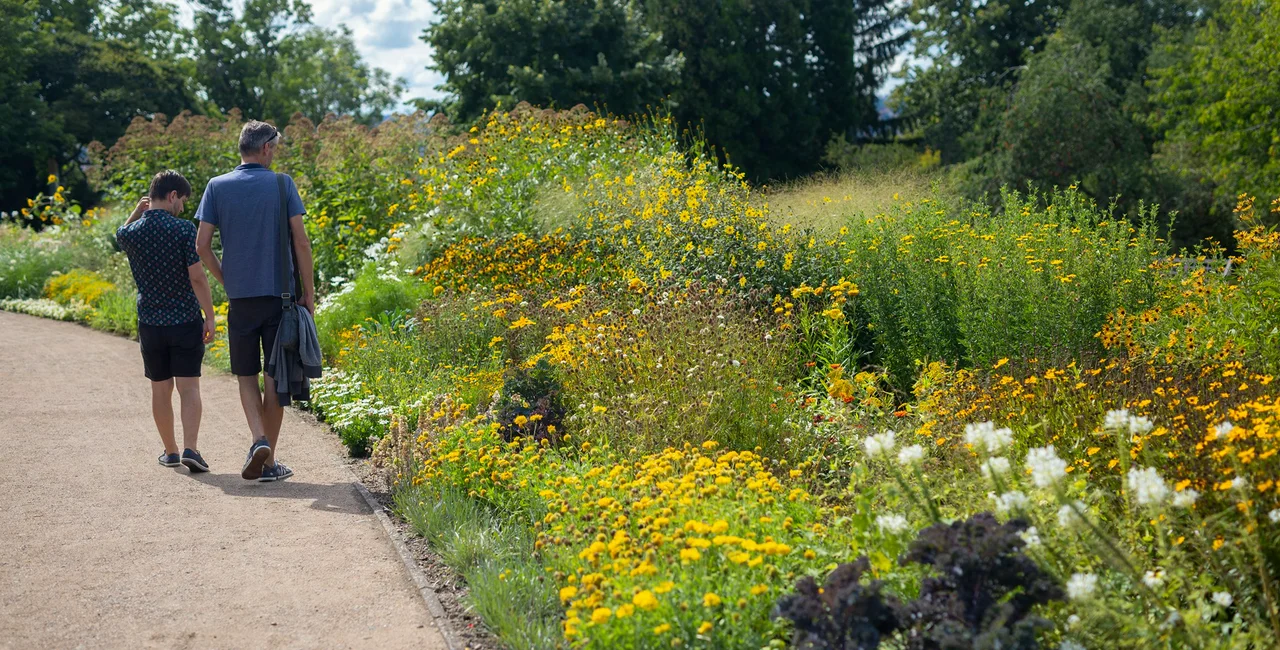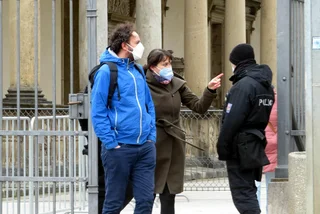Mortar round found in Vltava stops traffic in Prague center
Police sealed off Masarykovo nábřeží and some adjoining streets in the center of Prague for around 90 minutes Monday afternoon as a live mortar round was found in the Vltava River near Žofín Island, a police spokesman told reporters. A bomb disposal expert called to the scene removed the ammunition for disposal. Traffic resumed just before 4 p.m. The object was retrieved from the water via a magnet used by the man who alerted officials to the mortar's presence. The police sealed off the area around the mortar and called in the bomb disposal expert. The expert determined the object to be a live infantry mortar round made in Czechoslovakia, likely from the Second World War.
Praha: Policisté v tuto chvÃli uzavÅ™eli Masarykovo nábÅ™ežà a nÄ›které pÅ™ilehlé ulice. Důvodem je nález pravdÄ›podobnÄ› minometného granátu ve VltavÄ› nedaleko ŽofÃna. ÄŒekáme na pÅ™Ãjezd pyrotechnika. #policiepha pic.twitter.com/qoohhbz0vv
— Policie ÄŒR (@PolicieCZ) April 5, 2021
Former health minister Prymula to work for Agel group
Former health minister Roman Prymula has become an external consultant to the Agel group owned by Tomas Chrenek, Czech Television (CT) said today. Agel itself has confirmed that it is cooperating with Prymula. Agel owns the firm Avenier, the distributor of the vaccine from Moderna, and it also won a tender for the distribution of vaccines from Johnson&Johnson. Referring to Russian sources, Czech Radio said on Sunday that Avenier might handle distribution of the Russian vaccine Sputnik V, so far unapproved in the Czech Republic and the EU. An Avenier executive, however, has denied this saying that because the Czech government has not bought the vaccine its distribution in the Czech Republic by any distributor is not possible.
Czech botanical gardens seeking government support
In an open letter to officials, the Union of Botanical Gardens (UBZ) has asked the Czech government for help. Botanical gardens have remained closed during the coronavirus lockdown, but the state does not compensate their losses with any financial support. Most are not eligible for the existing programs of support. In the first three months of this year, they have lost an estimated CZK 10 million crowns in entrance fees and about another 10 million in other incomes, the UBZ said in its letter and are calling on the government to reopen their outdoor areas. The decrease in revenue has hit most botanical gardens whether owned privately or by associations. The biggest Czech botanical garden, in Prague, has sustained a loss of over CZK 6 million since the beginning of the year. According to the Czech statistical yearbook, 680,000 people visited 20 botanical gardens in the Czech Republic in 2019 with admission in a total of CZK 29.3 million.
Two million census forms already sent to statistical office
Czechs have sent two million filled-in population and housing census forms to the organizing Czech Statistical Office (CSU), CSU chairman Marek Rojíček told journalists Monday. From the towns with over 10,000 population, the residents of Neratovice, Central Bohemia, and Most, north Bohemia, have been the most active. The online census started on March 27 and it will end on May 11. Czechs may also send paper census forms until April 17. The two million forms mean that roughly four million people have been counted, Rojíček said. During Easter, the number of forms sent in increased by over 600,000, he added. The Czech Republic has about 10.5 million inhabitants In Neratovice, there are over 46 filled-in forms per 100 flats, followed by Most and Kolin with about 45 forms per 100 flats. The largest Czech cities Prague and Brno have proven similar with regard to their residents' participation in the census; in both towns, residents sent 42.1 forms per 100 flats.
Automobile transport, industry diminishing occurrence of butterflies
Researchers have noticed a significant decline in the number of butterflies in the Czech lands due to car traffic and industry as well as agriculture, Brno-based Mendel University said in a press release. The number of individuals or quantity of butterflies in the landscape is diminishing, often quite considerably, rather than the number of species. The decline in the past decades has mostly affected urban and industrial agglomerations as well as the intensively used agricultural landscape. Over the past century, roughly 14 percent of diurnal and 3 percent of all butterflies disappeared in the whole of South Moravia Region. In the whole of the Czech Republic, these were 10 percent and 2 percent, respectively a spokesperson from the Faculty of AgriSciences in Brno said. Some species, previously quite common, have become rare.












 Reading time: 3 minutes
Reading time: 3 minutes 






























